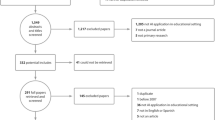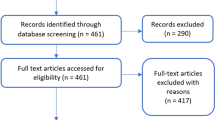Abstract
Libraries have always been a repository of knowledge, a place where people from all walks of life can come to learn and grow. In today’s fast-paced world, libraries must keep up with the changing times in order to remain relevant. Artificial intelligence (AI) is one of the most promising technologies that can help libraries achieve this goal. AI can help libraries automate processes, provide personalized services, and improve user experiences. However, with great power comes great responsibility, and AI is no exception. Libraries have an ethical and equitable promise to their users, and AI must be deployed in a way that upholds these promises. This study explores the ethical and equitable use of AI in libraries, how it can empower users, and what librarians need to consider when implementing AI. The result of the reviewed articles showed that 1499 out of 170,262 papers have been identified as describing AI in libraries through ethical and equitable methodologies and prospect for empowering library users. The future studies can focus on other professional terms, such as Trustworthy AI, Fairness in AI, Explainable AI, and Human-in-the-loop, and how this can impact libraries, and other professionals.




Similar content being viewed by others
Data availability
We do not analyze or generate any datasets, because our work proceeds within a theoretical approach. One can obtain the relevant materials from the references presented below.
References
Cordell, R.: Machine Learning + Libraries: A Report on the State of the Field, pp. 1-2. LC Lab Digital Strategy Directorate (2020). https://labs.loc.gov/static/labs/work/reports/Cordell-LOC-ML-report.pdf
Subaveerapandiyan, A.: Application of artificial intelligence (AI) in libraries and its impact on library operations review. Libr. Philos. Practice (e-journal) 7828 (2023). https://digitalcommons.unl.edu/libphilprac/7828
Bradley, F.: Representation of libraries in artificial intelligence regulations and implications for ethics and practice. J Austr. Libr. Inf. Assoc. 71(3), 189–200 (2022). https://doi.org/10.1080/24750158.2022.2101911
Talley, N.B.: Imagining the use of intelligent agents and artificial intelligence in Academic Law Libraries. Law Libr. J.Libr. J. 108, 383 (2016)
Bi, S., Wang, C., Zhang, J., Huang, W., Wu, B., Gong, Y., Ni, W.: A survey on artificial intelligence aided internet-of-things technologies in emerging smart libraries. Sensors 22(8), 2991 (2022). https://doi.org/10.3390/s22082991
Hauptmann, A.G., Witbrock, M.J., Christel, M.G.: Artificial intelligence techniques in the interface to a digital video library. In: CHI ’97 Extended Abstracts on Human Factors in Computing Systems (1997). https://doi.org/10.1145/1120212.1120214
Zhang, X.: On the innovative work and development of library reader service in the era of artificial intelligence. Wirel. Commun. Mobile Comput. 2022, e3779660 (2022). https://doi.org/10.1155/2022/3779660
Taneja, H.: The era of ‘move fast and break things’ is over. Harvard Bus. Rev. (2019). Available at https://hbr.org/2019/01/the-era-of-move-fast-and-break-things-is-over
Miao, Z.: Investigation on human rights ethics in artificial intelligence researches with library literature analysis method. Electron. Libr.Libr. 37(5), 914–926 (2019). https://doi.org/10.1108/EL-04-2019-0089
Shelton, S.D.: Robots stole my job—AI and robotics libraries. Comput. Libr.. Libr. 39(1), 22–27 (2019)
Asemi, A., Asemi, A.: Artificial intelligence (AI) application in library systems in Iran: a taxonomy study. Libr. Philos. Practice (e-Journal) (2018) https://digitalcommons.unl.edu/libphilprac/1840
Panda, S., Chakravarty, R.: Adapting intelligent information services in libraries: a case of smart AI chatbots. Libr. Hi Tech News 39(1), 12–15 (2022). https://doi.org/10.1108/LHTN-11-2021-0081
Cordell, R.: Machine Learning and Libraries Interview with Kate Zwaard, pp. 1–5. LC Lab Digital Strategy Directorate (2020). https://labs.loc.gov/work/experiments/
Ylipulli, J., Luusua, A.: Without libraries what have we? Public libraries as nodes for technological empowerment in the era of smart cities, AI and big data. In: Proceedings of the 9th International Conference on Communities & Technologies—Transforming Communities. ACM Press, New York, pp. 92–101 (2019)
Linder, C.: The libraries of the future will be AI Archivists. Popular Mechanics (2020). https://www.popularmechanics.com/technology/a32436235/library-of-congress-machine-learning-newspaper-images/
O’Neil, C.: Weapons of Math Destruction: How Big Data Increases Inequality and Threatens Democracy, 1st edn., p. 21. Crown, New York (2016)
Smith, L.C.: Artificial intelligence in information retrieval systems. Inf. Process. Manage. 12(3), 189–222 (1976). https://doi.org/10.1016/0306-4573(76)90005-4,pp.194-215
Arlitsch, K., Newell, B.: Thriving in the age of accelerations: a brief look at the societal effects of artificial intelligence and the opportunities for libraries. J. Libr. Adm.Libr. Adm. 57(7), 789–798 (2017). https://doi.org/10.1080/01930826.2017.1362912
Kim, Y., Yoo, J.H., Choi, K.: A motion and similarity-based fake detention method for biometric face recognition systems. IEEE Int. Conf. Consum. Electron.Consum. Electron. 57(2), 756–762 (2011)
Martonik, A.: Android Fingerprint Sensors, Ranked. Available at http://android-central.com/android-fingerprint-sensors-ranked. Retrieved on 18 March 2023 (2015)
Dave, G., Chao, X., Sriadibhatla.: Face Recognition in Mobile Phones. Department of Electrical Engineering Stanford University, Stanford, California (2010)
Byrum, J.: Build a Diverse Team to Solve the AI Riddle. MIT Sloan Management Review (2020). https://sloanreview.mit.edu/article/build-a-diverse-team-to-solve-the-ai-riddle/
Seo Jo, E., Gebru, T.: Lessons from Archives: Strategies for Collecting Socio-Cultural Data in Machine Learning, p. 2. https://doi.org/10.1145/3351095.3372829 (2019)
Balleste, R.: The future of artificial intelligence in your virtual libraries. Comput. Libr.. Libr. 22(9), 10–15 (2002)
Zhu, C., Jiang, T., Cao, H., Sun, W., Chen, Z., Liu, J.: Longitudinal analysis of meta-analysis literature in the database of ISI Web of Science. Int. J. Clin. Exp. Med. 8(3), 3559–3565 (2015)
Mukhlif, F., Hodonu-Wusu, O.J., Noordin, A.K., Kasirun, M.Z.: Major trends in device to device communications research: a bibliometric analysis. In: 2018 IEEE 16th Student Conference on Research and Development (SCOReD), Babgi, Malaysia, 26–28 Nov 2018
Showers, B.: The evolution of library metrics. In: Tattersall, A. (ed.) Altmetrics: A Practical Guide for Librarians Researchers and Academics, pp. 49–63. Facet, London (2016)
Showers, B.: Library Analytics and Metrics: Using Data to Drive Decisions and Services. Facet Publishing, London (2015)
Sin, S.C.J., Kim, K.S.: Use and non-use of public libraries in the information age: a logistic regression analysis of household characteristics and library services variables. Libr. Inf. Sci. Res.. Inf. Sci. Res. 30(3), 207–215 (2008)
Haffenden, C., Fano, E., Malmsten, M., Börjeson, L.: Making and using AI in the library: creating a BERT model at the national library of Sweden. Coll. Res. Libr.Libr. 84(1), 30–48 (2023). https://doi.org/10.5860/crl.84.1.30
Balleste, R.: A hypothetical case study: creating AI assistants in the law library. Leg. Ref. Serv. Q. 26(1–2), 47–56 (2007). https://doi.org/10.1300/J113v26n01_04
Yordy, L.: The library of Babel for prior art: using artificial intelligence to mass produce prior art in patent law. Vanderbilt Law Rev. 74(2), 521 (2021)
Williams, R.: Artificial Intelligence Assistants in the Library: Siri, Alexa, and Beyond. Information Today (2019). https://www.infotoday.com/OnlineSearcher/Articles/Features/Artificial-IntelligenceAssistants-in-the-Library-Siri-Alexa-and-Beyond-131529.shtml
Johnson, B. Libraries in the Age of Artificial Intelligence. Computers in Libraries (2018). https://www.infotoday.com/cilmag/jan18/Johnson--Libraries-in-the-Age-ofArtificial-Intelligence.shtml
Wei, Q.: Application of virtual reality technology in medical university libraries in the era of artificial intelligence. Agric. Libr. Inf. 31(8), 63–70 (2019). https://doi.org/10.13998/j.cnki.issn1002-1248.2019.08.19-0261
Oyelude, A.A.: What’s trending in libraries from the internet cybersphere–artificial intelligence and other emerging technologies. Libr. Hi Tech News 34(2), 11–12 (2017). https://doi.org/10.1108/LHTN-02-2017-0008
Hodonu-Wusu, J.O., Lazarus, N.G., Otun, M.O., Arekemase, O.B., Olayiwola, T.T.: Big data and openness: a big issue with librarians. Libr. Philos. Practice (e-journal). 4279 (2020). https://digitalcommons.unl.edu/libphilprac/4279
Li, J., & Wang, H.: Application of artificial intelligence in libraries. In: 3rd International Conference on Artificial Intelligence and Advanced Manufacture (AIAM), pp. 323–329 (2021). https://doi.org/10.1109/AIAM54119.2021.00072.
Hodonu-Wusu, J.O., Noorhidawati, A., Abrizah, A.: Malaysian researchers on open data: the first national survey on awareness, practices and attitudes. Malays. J. Libr. Inf. Sci.Libr. Inf. Sci. 25(2), 1–20 (2020)
Wu, J., Williams, K.M., Chen, H.-H., Khabsa, M., Caragea, C., Tuarob, S., Ororbia, A.G., Jordan, D., Mitra, P., Giles, C.L.: CiteSeerX: AI in a digital library search engine. AI Mag. 36(3), 35–48 (2015). https://doi.org/10.1609/aimag.v36i3.2601
Sarker, I.H.: AI-based modeling: techniques, applications and research issues towards automation, intelligent and smart systems. SN Comput. Sci. 3, 158 (2022)
Sarker, I.H.: Machine learning: algorithms, real-world applications and research directions. SN Comput. Sci. 20, 21 (2021)
Sarker, I.H.: Deep learning: a comprehensive overview on techniques, taxonomy, applications and research directions. SN Comput. Sci. 2(6), 1–20 (2021)
Wusu, H.O.: The Use on Library: Learning, Searching and Research Strategies Techniques for Students in Tertiary Institutions in Nigeria, pp. 83–86. Afolabi Press, London (2015)
Pang, N., Dou, C.: Artificial intelligence inspired computer aided design of library service system. Comput. Aided Des. Appl. 20(55), 53–63 (2023)
Tian, Z.: Application of artificial intelligence system in libraries through data mining and content filtering methods. J. Phys. Conf. Ser. 1952, 042091 (2021). https://doi.org/10.1088/1742-6596/1952/4/042091
Xu, B., Zhao, Y., Feng, H., Zhu, S., Yu, J., Zhang, M., Kuzminykh, V.: ACM International Conference Proceeding Series, pp. 170–174 (2020). https://doi.org/10.1145/3438872.3439076
Barlindhaug, G.: Artificial intelligence and the preservation of historic documents. Proc. Document Acad. 9(2), 999 (2022). https://doi.org/10.35492/docam/9/2/9/
Hylland, O.M.: “Even better than real thing? Digital copies and digital museums in a digital cultural policy. Cult. Unbound. 9(1), 62–84 (2017)
Hughes, L.M.: Digitizing Collections: Strategic Issues for the Information Manager, vol. 2. Facet Publishing, New York (2004)
Rolan, G., Humphries, G., Jeffrey, L., Samaras, E., Antsoupova, T., Stuart, K.: More human than human artificial intelligence in the archive. Archiv. Manuscr. 47(2), 179–203 (2019)
Han, X., Papyan, V., Prokop, E., Donoho, D.L., Johnson, C.R.: Artificial intelligence and discovering the digitized photo-archive. In: Jaillant, L. (ed.) Archives, Access and Artificial intelligence: Working with Born-Digital and Digitized Archival Collections, pp. 29–61. Bielefeld University Press, USA (2022)
Chen, J., Zhuo, Z., Lin, J.: Does ChatGPT play a double-edged sword role in the field of higher education? An in-depth exploration of the factors affecting student performance. Sustainability 15(24), 16928 (2023)
Hodonu-Wusu, J.O.: Open science: a review on open peer review literature. Libr. Philos. Practice 1, 31 (2018)
Hodonu-Wusu, J.O., Noorhidawati, A., Abrizah, A.: The cautious faculty: Malaysian university researchers’ awareness, experiences, and attitudes towards open peer review. Malays. J. Libr. Inf. Sci.Libr. Inf. Sci. 26(3), 57–76 (2021)
Weijia, G.U.O.: Research on influencing factors of libraries’ artificial intelligence readiness. J. Agric. Libr. Inf. Sci. 34(5), 47–56 (2022). https://doi.org/10.13998/j.cnki.issn1002-1248.22-0016
Safiya, N.U.: Safiya Umoja noble PhD on Twitter (2020). Available at https://twitter.com/safiyanoble/status/1267978038072889344
Author information
Authors and Affiliations
Corresponding author
Ethics declarations
Conflict of interest
On behalf of all the authors, the corresponding author states that there is no conflict of interest.
Additional information
Publisher's Note
Springer Nature remains neutral with regard to jurisdictional claims in published maps and institutional affiliations.
Rights and permissions
Springer Nature or its licensor (e.g. a society or other partner) holds exclusive rights to this article under a publishing agreement with the author(s) or other rightsholder(s); author self-archiving of the accepted manuscript version of this article is solely governed by the terms of such publishing agreement and applicable law.
About this article
Cite this article
Hodonu-Wusu, J.O. The rise of artificial intelligence in libraries: the ethical and equitable methodologies, and prospects for empowering library users. AI Ethics (2024). https://doi.org/10.1007/s43681-024-00432-7
Received:
Accepted:
Published:
DOI: https://doi.org/10.1007/s43681-024-00432-7




